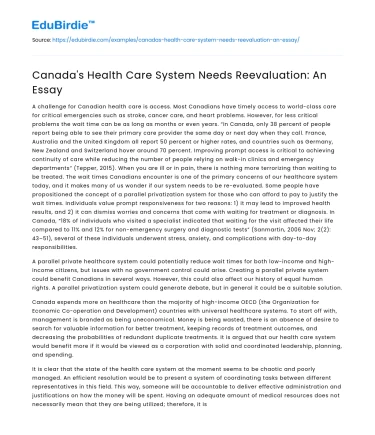A challenge for Canadian health care is access. Most Canadians have timely access to world-class care for critical emergencies such as stroke, cancer care, and heart problems. However, for less critical problems the wait time can be as long as months or even years. “In Canada, only 38 percent of people report being able to see their primary care provider the same day or next day when they call. France, Australia and the United Kingdom all report 50 percent or higher rates, and countries such as Germany, New Zealand and Switzerland hover around 70 percent. Improving prompt access is critical to achieving continuity of care while reducing the number of people relying on walk-in clinics and emergency departments” (Tepper, 2015). When you are ill or in pain, there is nothing more terrorizing than waiting to be treated. The wait times Canadians encounter is one of the primary concerns of our healthcare system today, and it makes many of us wonder if our system needs to be re-evaluated. Some people have propositioned the concept of a parallel privatization system for those who can afford to pay to justify the wait times. Individuals value prompt responsiveness for two reasons: 1) it may lead to improved health results, and 2) it can dismiss worries and concerns that come with waiting for treatment or diagnosis. In Canada, “18% of individuals who visited a specialist indicated that waiting for the visit affected their life compared to 11% and 12% for non-emergency surgery and diagnostic tests” (Sanmartin, 2006 Nov; 2(2): 43–51), several of these individuals underwent stress, anxiety, and complications with day-to-day responsibilities.
A parallel private healthcare system could potentially reduce wait times for both low-income and high-income citizens, but issues with no government control could arise. Creating a parallel private system could benefit Canadians in several ways. However, this could also affect our history of equal human rights. A parallel privatization system could generate debate, but in general it could be a suitable solution.
Save your time!
We can take care of your essay
- Proper editing and formatting
- Free revision, title page, and bibliography
- Flexible prices and money-back guarantee
Canada expends more on healthcare than the majority of high-income OECD (the Organization for Economic Co-operation and Development) countries with universal healthcare systems. To start off with, management is branded as being uneconomical. Money is being wasted, there is an absence of desire to search for valuable information for better treatment, keeping records of treatment outcomes, and decreasing the probabilities of redundant duplicate treatments. It is argued that our health care system would benefit more if it would be viewed as a corporation with solid and coordinated leadership, planning, and spending.
It is clear that the state of the health care system at the moment seems to be chaotic and poorly managed. An efficient resolution would be to present a system of coordinating tasks between different representatives in this field. This way, someone will be accountable to deliver effective administration and justifications on how the money will be spent. Having an adequate amount of medical resources does not necessarily mean that they are being utilized; therefore, it is important to also incorporate the volume of services or use of resources. There have been research suggesting that medical technology plays a substantial role for enhancing the efficacy of medical services, ultimately benefiting patients while reducing healthcare expenditures over time. For instance, medical technologies such as new diagnostic equipment and innovative surgical and laboratory procedures revolutionizes the efficiency of hospitals and enhances the security and welfare of patients.






 Stuck on your essay?
Stuck on your essay?

